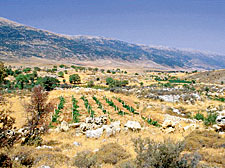|
|
 |
| |

Lebanon’s Bekaa Valley |
Serge’s wines from the war-torn Bekaa Valley
Against all the odds Serge Hochar produces great wines in war devastated Lebanon
SERGE Hochar is used to war. Since he took over his father’s Bekaa valley vineyard in 1959 there have been six – including a 15 year long civil war. Battles have raged around his vines, the road to his Chateau Musar winery has been attacked with bombs and rockets. To him coping with war is a part of the winemaking process and has to be accepted – like the weather.
Over the years Serge Hochar has coped extremely well, managing to produce an internationally acclaimed wine practically every year.
Talking to him by phone – at his winery half way up a mountain, north of Beirut – on Saturday morning it soon became apparent that this latest conflict has him fazed, it is completely unexpected.
Jane Sowter one of Chateau Musar’s small team of workers based at their distribution centre in London was equally shocked. She has worked with the Hochar family for 18 years.
“Serge”, she told us, “is normally inspirational, he understands the politics of the region and is usually prepared for every eventuality. I spoke to him this morning,” she explains “and he is very depressed”.
Serge Hochar’s Father, Gaston, began winemaking as a hobby, in 1930.
During World War II, he was inspired by British army Liaison Officer Ronald Barton, a member of an Anglo-Irish family which first produced French wine in 1722 and still make Bordeaux’s highly rated, Leoville-Barton wine.
By the mid-1960s, a growing and increasingly sophisticated Lebanese middle class was drinking wine. But war returned to the Middle East and it is the Lebanon, the world’s first ‘melting pot’, with its many races and cultures which is one of its biggest victims. Beirut was destroyed.
Against all the odds the Hochars managed to continue making wine, but their customers fled. Serge and his younger brother Ronald turned to the fledgling UK wine market.
Chateau Musar’s status as an international wine commenced in 1979 when at the Bristol wine fair, Christies Director of wine Michael Broadbent declared it the “discovery of the fair”. Five years later Decanter magazine awarded Serge Hocher the accolade ‘Wine man of the year’.
At the time Chateau Musar is one of only two wineries in Lebanon. The other is Chateau Ksara founded in the 1850s by Jesuit priests from France.
But the history of wine making in the Lebanon begins nearly 5,000 years before. The Phoenicians, who first inhabited the area, although not the first to make wine, invented viticulture and turned wine into a desirable and highly profitable product. Egyptian Pharaohs were entombed with jars of Phoenician wine and the Jewish chronicler Ezekiel referred to Lebanese wine as a unique commodity.
This was at least 2,000 years before the so called “old wine world” countries of Italy and France first learned the wine making art. With the ending of the civil war in 1991 the Lebanese began to put their country together again. New modern vineyards were created, some of them had visitor centres. The Bekaa Valley which only a few years before was a battle ground for warring nations and paramilitary armies, had become a tourist attraction. All this progress is threatened by the Israeli bombardment of the last few weeks.
Regardless of the conditions, Serge Hochar will continue to make wine.
One has only to drink his wine to realise he is an unstoppable force. Winemakers must bow to the market is a modern mantra.
Château Musar gives a giant raspberry to those who peddle this quasi-scientific excuse for mediocre uniformity.
Jane Sowter puts it this way: “Serge’s wines are different, they vary from vintage to vintage.
“It is possible to love one batch and dislike the next.” Serge himself explains: “My objective is to make a wine that is true to its nature rather than good to the taste.”
Fortunately for we wine drinkers the first often leads to the second.
|
 |
|
| |
|
 |
|









